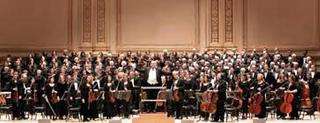|
Back
The Oratorio Triumphant New York
Isaac Stern Auditorium, Carnegie Hall
11/12/2018 -
Gerald Finzi: Requiem da Camera
Samuel Barber: Agnus Dei
Sir Michael Tippett: A Child of Our Time
Gabriella Reyes de Ramirez (Soprano), Zoie Reams (Mezzo-Soprano), David Portillo (Tenor), Luthando Qave, Nathaniel Sullivan (Baritones)
New York Choral Society and Orchestra, David Hayes (Conductor)

D.Hayes, NY Choral Society
“I remain a humanist. We are a very curious race.”
Sir Michael Tippett (1905-1998)
“The world turns on its dark side. It is winter.”
Sir Michael Tippett, opening lines from A Child of Our Time
Such a wondrous piece as Sir Michael Tippett’s A Child of Our Time deserves an evening to itself. Nothing in literature, music, even philosophy compares to the composer’s achievement here. And David Hayes had his 75-voice choir, a large orchestra, and–above all–four soloists whose diversity of singing made the drama of the oratorio even more splendid.
Yet, most audiences might think that a single one-hour work might not be worth the price of a ticket. Thus Mr. Hayes offered an opening half which gave a patina for the two purposes of the concert. One to recognize the century since the end of the “War to End All Wars” (ha!); the other to remember Kristallnacht, 20 years later, when much of the German populace attacked Jewish shops and Jewish people, after one of their diplomats was shot by a young Jewish lad.
Yet both opening works were Lilliputian compared to the Promethean Tippett work. The first was a rare performance (I doubt if it had ever been done in New York) of Gerald Finzi’s Requiem da Camera, written five years after the Armistice, dedicated to several people who had been killed in that war.
Finzi is part of the rustic Frederick Delius/Ralph Vaughan Williams school, celebrating nature, taking care not to offend lulling audiences into soporific appreciation. (This is unfair. Sir Ralph wrote some splendid symphonies, and Delius did have his overwhelming...er...measures)
But Gerald Finzi is best appreciated as a well-meaning, deft composer whose sequacious sections evaporate after the last measures.
The Requiem da Camera has a lovely orchestral prelude for the chamber orchestra. Mr. Hayes possibly expanded the New York Choral Society Orchestra, for that sensitive opening was a bit muddied. Yet one could not fault the large Choral Society’s pictures of the words–and baritone Nathaniel Sullivan sang the Thomas Hardy poem with great eloquence.
Three verses of farmland celebrations (“...a man harrowing clods...”) can almost instinctively be set by composers of this British school. Yet nothing of Finzi here stands out. Especially since two of the three poets he quotes–John Masefield and Thomas Hardy–have such magnificent words that music would only gild these arboreal lilies of the field.
The following Agnus Dei was Samuel Barber’s own Adagio, written originally for string quartet, then in the orchestral piece which usually wears out its welcome.
Alex Ross is quoted in the program as saying, “Whenever the American dream suffers a catastrophic setback, Barber’s Adagio plays on the radio.” Mr. Ross may have meant that producers use it as a shortcut. (“Hey, they bombed the Yonkers City Hall. Get out that music with all the violins!”) For chorus and orchestra, it was not augmented. The sopranos were rather shrill, but no human voice should be asked to imitate quivering violins at their highest.
Now to the Tippett. He wrote the complicated libretto, based peripherally on the slaughter, based on the Jungian meeting of opposites, based–far too much for our times–on the terror of human upon human.
(How would Sir Michael have set our President’s declaration that selling arms to Arabia was good for American industry, as against these arms being used as genocide against the civilians of Yemen?)
Musically, he modeled A Child of Our Time on a Bach Passion, with African-American spirituals an appropriate equivalent for a Bach chorale.
The result is, unlike the Finzi, a work of overwhelming drama. Not histrionics at all, but notes of agony and forgiveness, music which issues its contradictions, its ironies and its rebuking which balances compositional subtlety with personal emotional fury. And the spirituals were not parenthetical, but given full orchestral and choral treatment.
Still, the New York Choral Society stood out, where their works with chorus or a capella were issued with zeal and tenderness.
The four soloists could not have been bettered. Luthando Qave was the narrator with a rich, angry spot-on baritone. David Portillo was the operatic tenor incarnate.

G. Reyes/Z. Reams
My personal two favorites could not have been more different. Gabriella Reyes is a star. No two ways about it. The voice was a full-throated, beautifully declaimed operatic soprano, her expression as she sung the spiritual was one of ethereal grandeur.
Her opposite was Zoie Reams, for whom the only adjective is “pure.” At times, she was overwhelmed by the orchestra, but these were rare, for she understood immediately not only the grandeur but the gravity of the work.
My only qualm–a qualm which made me almost wretch–-was Sir Michael’s finale, an all-out corny, schmaltzy pull-out-all-the-stops Deep River. It resembled nothing less than Jerome Kern’s horrifying finale to 1927’s Showboat.
Oh well, genius has its imperfections. For the most part, Mr. Hayes directed a thrilling production for one of the most thrilling and thoughtful oratorios in musical history.
Harry Rolnick
|